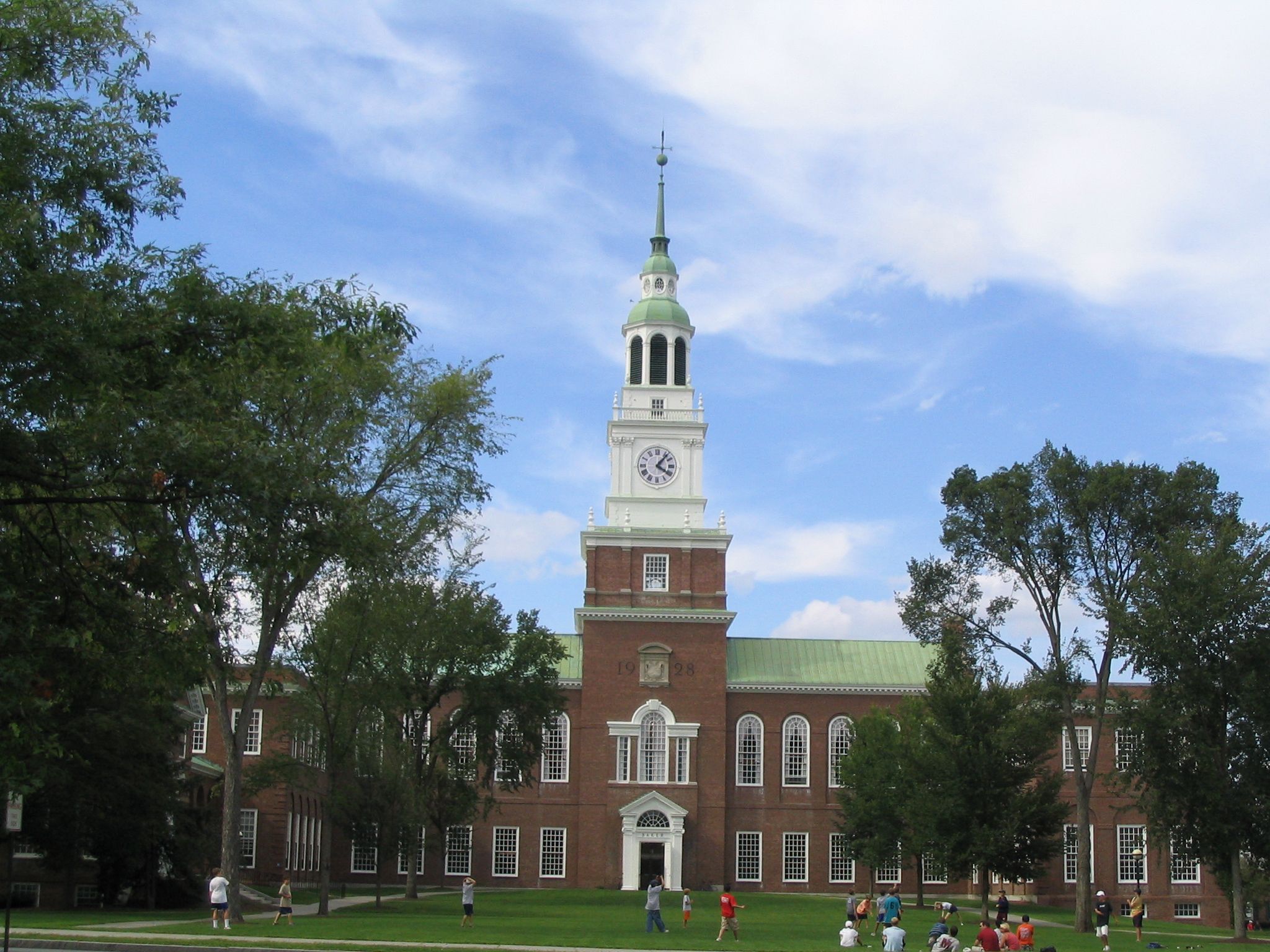
Let me say this much in defense of the embattled fraternities of Dartmouth College: As a pledge during the winter of 2000, I was never forced to wade in a "kiddie pool of vomit, urine, fecal matter, semen," as one student claimed he did in a dismayingly viral 2012 Rolling Stone article titled "Confessions of an Ivy League Frat Boy."
Oh, there were veritable oceans of bad beer. And, for some reason, everlasting brotherhood involved the ingestion of several Taco Bell gut-bombs in a freakishly short span of time, with predictable results. I am also pretty sure that I consumed a living goldfish. Reason, again, unclear. There was, near the end of the boozy affair, a pig that we pledges were forced to roast on a spit for the duration of a whole night. It was many years before I could eat barbecue again.
But at least there was no thrashing in the bodily effluvia of others. Or, if there was, I had enjoyed too much of Milwaukee's Best to remember.
The fraternities of Dartmouth are proof that there is very much such a thing as bad publicity. To wit, holding a "ghetto party" (1998) or a Bloods and Crips party (2013). What parent can justify spending $50,000 a year for that? In 1999, the Gamma Delta Chi fraternity actually staged a "panty raid" at two sororities. This seemed hilarious to my still-teenage mind, the very stuff that made college the proverbial four best years of one's life. It seems a lot closer to brute sexual aggression today.
Dartmouth's current president, Philip J. Hanlon, was himself once a member of Alpha Delta, the fraternity on which Animal House is based. Hanlon—or "Juan Carlos," to his onetime brothers—arrived on campus to assume the presidency in the midst of the fallout from the Rolling Stone article, along with other unflattering revelations about the legendary depravities of Webster Avenue's frat row. After watching applications plummet, he spoke out last spring against a "culture where dangerous drinking has become the rule," a refreshingly strong rebuke to the fraternities that have long controlled social life on campus.
Dartmouth is hardly an outlier in this respect, its notoriety replicated at virtually every college in the nation with a Greek system. Peggy R. Sanday, a University of Pennsylvania sociologist who has extensively studied rape at fraternities, has written that these so-called brotherhoods often have a "superior status" because they are older and more numerous than sororities, which rarely hold parties. Fraternities relish their power, Sanday argues, fostering a culture "that makes sexual exploitation a condition of manhood."
The evidence is on her side. Fraternity brothers are three times more likely than their nonaffiliated peers to commit rape, a 2007 study found. Greek houses are often the primary purveyors of alcohol on campus, which is involved in 89 percent of collegiate sexual assaults. Women are not guests at fraternity events but, as one Georgia Tech fraternity deems them, "rapebait." An intelligent, accomplished young woman becomes a "girl" whose own will can easily be disregarded or subverted. Or, to borrow from the chant of a Yale fraternity, "No means yes, yes means anal." And it is just as clear that fraternities exercise their "dark power" (to borrow a phrase from Caitlin Flanagan's masterful plunge into the Greek abyss) over administrators who are supposed to monitor them. Of the 95 colleges being investigated by the federal government for the mishandling of sexual assault complaints, all but about a half-dozen boast an active Greek system.
Among those facing investigation is nearly half of the Ivy League: Dartmouth, Harvard and Brown. Yale isn't on the list but was recently the subject of a similar probe. So was Princeton. Columbia, where a female student has taken to carrying a mattress around campus until her alleged rapist is expelled, is under investigation along with Barnard, its sister school. If these are the colleges that produce our leaders, it's no wonder that so many Manhattan investment banks and Silicon Valley tech firms replicate the sexual politics of a fraternity basement on a Friday night. Same players, same rules. Impunity is a powerful drug, especially when laced with a dusting of silence.
To his credit, Hanlon appears unwilling to let the present state of affairs continue. Late last week, he released a plan, called "Moving Dartmouth Forward," whose centerpiece is a ban on hard alcohol at the college, a bold measure predicated on his well-grounded belief that the consumption of liquor is inordinately responsible for the social ills plaguing Dartmouth. Hanlon is also moving to eliminate semester-long pledge terms, a sign that he intends to weaken the Greek houses. And he is instituting residential clusters, hoping students will choose to stay on campus instead of flocking to Webster Avenue.
Combined, these tough new rules may be enough to vitiate the Greek system and send the national media looking elsewhere for tawdry frathouse exposés. There will be a little less drinking; the next panty raid or ghetto party will be met with the summary expulsion of the responsible house. Alumni will praise Hanlon as the savior of Dartmouth and its U.S. News & World Report rankings. They will call him a moderate with a vision.
Moderation, though, is precisely the problem. The moment clearly calls for a national leader to articulate why fraternities, a vestige of the 19th century, have no business on a 21st century campus. Why boys can no longer just be boys. Someone who diagnoses campus sexual assault as an epidemic, not something perpetrated only by the occasional outlier. A president who can eloquently equate the treatment of female students today to that of Jewish and black students 50 years ago—a matter of moral principle, not administrative policy. Someone who is unafraid of phone calls from angry alumni.
While some colleges have already closed down their Greek houses, Dartmouth's fraternities are among the best known in the country, often landing the school on lists of the nation's frattiest colleges. Hanlon could trade in this notoriety, instead of merely disguising it, using the bully pulpit of an Ivy League presidency to boost similar frat-busting efforts across the nation.
Often, the Ancient Eight are accused of being self-interested institutions where one-percenters are minted and polished. Once in a while, though, these schools recognize that their prominence carries with it a greater responsibility. In the 1960s, for example, Yale's patrician president Kingman Brewster Jr., declared that he would not "preside over a finishing school on Long Island Sound," according to his biographer Geoffrey Kabaservice. Despite the chagrin of some hidebound Elis, he admitted women and welcomed greater numbers of Jews and minorities, thus announcing that a first-rate student could come from Harlem or Brooklyn, not just Hotchkiss or Dalton. Hanlon, who has the support of most alumni, could similarly become an agent of change, instead of merely playing a custodian of tradition.
My own sojourn on Webster Avenue lasted two years. I drifted from the house and, eventually, helped administrators de-recognize it over a crude internal publication that demeaned women. Some called me a traitor. And maybe they were right. But I distinctly remember the horror of one of the victims, a woman who had just learned that the men whom she considered friends had used her as a lascivious punch line. One of the offending newsletters, for example, had promised to reveal a brother's "patented date rape techniques."
This was a joke, I guess. I hope. But there is no place for it Dartmouth. There is no place for it at Florida State. There is no place for it anywhere.
Uncommon Knowledge
Newsweek is committed to challenging conventional wisdom and finding connections in the search for common ground.
Newsweek is committed to challenging conventional wisdom and finding connections in the search for common ground.
About the writer
Alexander Nazaryan is a senior writer at Newsweek covering national affairs.





